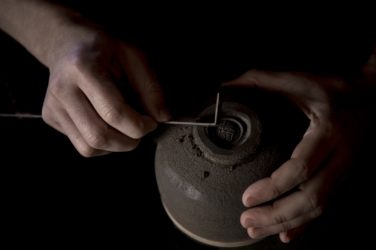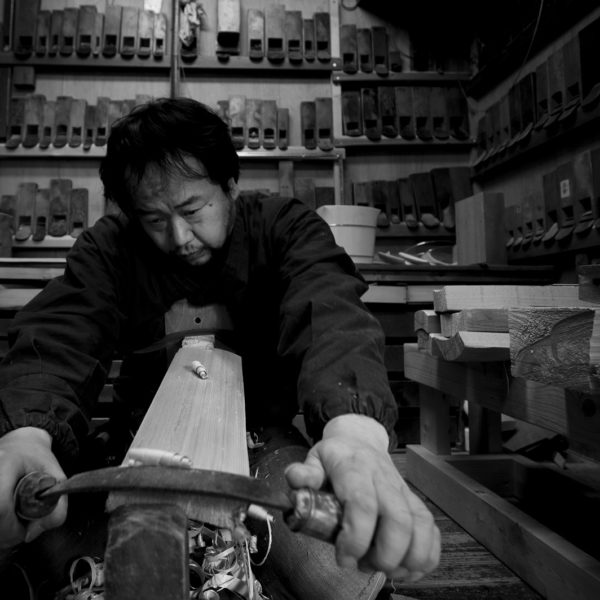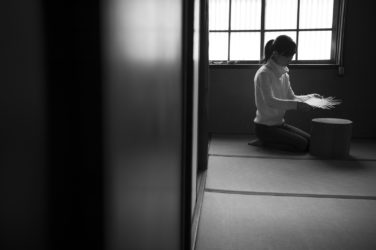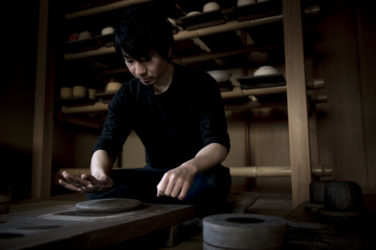
The word Shokunin (職人) means “artisan,” a word that signifies a person who has achieved a high level of accomplishment and a deep commitment to carry on the legacy of a traditional craft. A shokunin who works in the 21st century is an artisan whose work shows respect for the traditions of fine craftsmanship that have been handed down for generations—the handmade tools, the time-honored techniques, the finest natural materials, and the patience and indomitable spirit needed to carry on a painstaking craft.
Just as important is the understanding that the work of each Japanese artisan is an expression not only of an individual artisan, but a collaborative effort among the many who work to complete a single process. From the lumberjack, to the wood-turner, to the artisan who applies the final exquisite layer of lacquer—the work of the shokunin is the work of an entire community of fine craftsmen and women, each of whom plays a critical role in the creation of a finished vessel.

“When I was a child, my grandfather was making 200 wooden buckets a month! Wooden buckets were used in every household for everything from wash buckets to rice trays. By the time I was grown, plastic had replaced them and my father had fewer than 20 orders a month. I knew that if I was unable to think outside the box, our beautiful heritage would be lost. This is not about nostalgia. What is more important is that we not lose sight of the original ideals that guided our ancestors–that deep, connection to the natural world through the materials we use and an awareness that our lives are but a moment in a continuum of the craftsman’s tradition.” — Shuji Nakagawa, woodcraftsman
For over a thousand years, Kyoto was the imperial capital and home of much of Japanese culture and art. The shokunin of Kyoto are known for the production of objects tailored to suit the aristocratic taste of their imperial patrons, with a sophisticated elegance still apparent today.
Over the past 100 years with the increasing modernization of Japan, however, the way of life has changed dramatically from a time in which everything was made by hand to the present day when most things are manufactured. The disappearance of handmade things involves much more than the loss of the beauty of these mere objects. The accumulated knowledge and skills of generations of artisans and the collaborative spirit of those who work together to create these things is also at risk of being lost forever.

This exhibition features the work of five artisans from Kyoto each of whom works in a different medium, each with different background. All but the youngest artisan (and the only woman) in this group inherited their craft from generations past. Each of them is committed to carrying on their craft at the highest level of excellence while seeking ways to take those traditions forward into the current millennium.
Artisans included in this exhibition are Hosai Matsubayashi (Pottery), Shuji Nakagawa (Wooden Vessels), Chiemi Ogura (Bamboo Basketry), Keikou Nishimura (Lacquerware), and Hirotsugu Ogawa (Pottery).

Together they seek to redefine the meaning of shokunin and the work they do. They believe that today’s artisan must be mindful of the importance of maintaining the close bond with nature that their materials provide with the realization that their work transcends a single generation. Their hope is to inspire future generations throughout the world to pursue a path that goes beyond individual goals to serve the society in which they live.
This exhibition was co-curated by Sachiko Matsuyama and Diane Durston.
TOUR THE EXHIBITION
Opening Weekend Events
Artisans’ Tea Ceremony
Saturday, May 12 from 1:00-2:30pm
Tea ceremony continues to play a significant role in the production of traditional crafts in Kyoto—tea bowls, incense and flower containers, lacquer and bamboo serving trays, and many other utensils used in the performance of this ritual practice that dates back to the 15th century. The group of five of Kyoto’s finest artisans whose works are represented in the exhibition present a tea ceremony using utensils they have made for the Shokunin exhibition.
(Please note: Brief remarks by Hosai Matsubayashi will precede the Tea Ceremony.)
Artisans’ Demonstrations
Saturday, May 12 from 3:00-4:00pm
Two of the Kyoto artisans in the Shokunin exhibition, Shuji Nakagawa (woodwork), and Chiemi Ogura (bamboo weaving), demonstrate their crafts and talk with visitors about their lives and their work.

